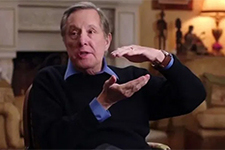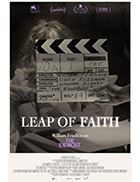Leap of Faith: William Friedkin on The Exorcist
|  Over the past decade, documentarian Alexandre O. Philippe has positioned himself as one of the primary chroniclers of contemporary American cinema. He has made feature-length documentaries about George Lucas’s fan fallout in The People vs. George Lucas (2010), the phenomenon of zombie movies in Doc of the Dead (2014), the most infamous on-screen murder in film history in 78/52: Hitchcock’s Shower Scene (2017), and, most recently, the deep origins of Ridley Scott’s game-changing horror-sci-fi hybrid in Memory: The Origins of Alien (2019). It is not surprising, then, that Philippe would eventually turn his attention to The Exorcist (1973), a genuinely earth-rattling cultural phenomenon if ever there were one (just look up YouTube videos of hundreds of people lined up around city blocks in 1973, standing in the cold waiting for the next showing, or interviews of shaken viewers taking refuge in the theater lobby after deciding they couldn’t take anymore). The Exorcist is a foundational film, a cornerstone of contemporary horror that transcended the genre while also rooting itself deeply in its iconography and thematic concerns. It became the first true horror blockbuster, managed to temporarily divert newspaper headlines from the ongoing Watergate scandal, and challenged conventions of high and low art on the big screen in a way that few films had ever done. What is surprising, though, is the simple, direct path that Philippe takes in exploring The Exorcist: a largely unadorned interview with director William Friedkin. The film’s title, Leap of Faith: William Friedkin on The Exorcist, despite sounding like a by-the-numbers Blu-ray featurette, sums up the film’s content perfectly. No one else associated with the film appears on camera, and outside of a few moments in which we hear Philippe asking questions, no one else’s voice is heard. This is the story of The Exorcist as told by Friedkin, and the depths he plumbs in discussing not just why he made the artistic choices he made, but how his own personal views, philosophies, beliefs, and outlook shaped those choices, suggests why The Exorcist works with such power, even to this day. Friedkin made the film as “a believer,” someone who is not just open to, but enthralled with, the idea of mystery and the supernatural, things that defy our understanding and rationality (one of the first things we hear him say is, “Everything has to do with either the mystery of fate or faith, and The Exorcist is about the mystery of faith”). In one of the most engaging segments, Friedkin wrestles with the film’s climax in which Father Karras takes the demon into his own body and then hurls himself out the window to his death. Friedkin confesses that he never fully understood what exactly happens and why and whether it even makes sense, and the exhilaration with which he tries to wrangle his thoughts and then invites others to try to explain it to him goes a long way in illuminating why the film continues to work with such unnerving spiritual and philosophical ferocity. At other points in the film he discusses more practical concerns, such as his search for the perfect score (he fired two composers and ended up going with the temp track he put together himself), his work with William Peter Blatty in adapting the novel (especially Friedkin’s insistence that they keep the prologue in Iraq), his use of subliminal imagery, his choice of Mercedes McCambridge to voice the demon, and his overall reliance on pure instinct in making virtually all of his artistic decisions. Philippe brings in elements from other Friedkin films, including the underrated Sorcerer (1977) and the notorious Cruising (1980) to demonstrate the director’s auteurist consistencies, but overall the film is focused intently on The Exorcist. If you have heard Friedkin in interviews before, you know what a great storyteller he is and how eloquent he can be in describing his intentions and decisions. Putting a nearly two-hour film entirely on his shoulders would seem risky, but almost as soon as he starts talking, we’re enthralled. He spins lots of stories, admits to questionable tactics he would no longer use (such as slapping an actor in the face to get tears and shooting a gun on-set to provoke a startle response), and confesses that Blatty really, really wanted to be cast as Father Karras (Friedkin ultimately went with the unknown Jason Miller, a playwright, which required him to fire and pay off Stacey Keach, who had already been hired). There are notable gaps in the topics covered (very little is said about Linda Blair and what she went through in her performance, for example), but one could easily make a five-hour film and still not cover all the bases. The Exorcist is a landmark, and while Leap of Faith doesn’t offer too much that is new, it succeeds in reminding us of how complex the artistic process is and how fraught it can be when not in confidents hands. Copyright © 2020 James Kendrick Thoughts? E-mail James Kendrick All images copyright © Shudder |
Overall Rating: 

 (3)
(3)


